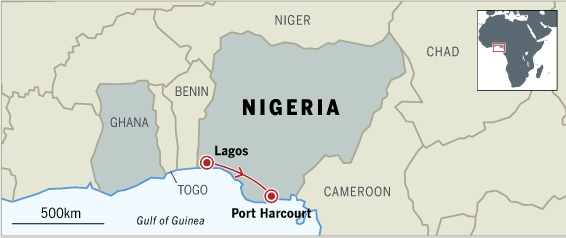April 17, 2012 11:53 am
Twelve days in west Africa: Port Harcourt, Nigeria
A flight over the Niger delta’s oil-tainted waterways indicates the environmental effects of illegal oil operations
Port Harcourt
Friday
12 Days in west Africa
Escorted by armed guards, with wailing sirens and honking horns, our convoy weaves through heavy traffic en route to the airfield operated by Shell Petroleum Development Corporation (SPDC). I have accepted an offer by Shell to fly by helicopter over the Niger delta to take a first-hand look at the environmental damage caused by illicit “bunkering”, the illegal tapping of oil from industry pipelines. Soon after take-off, our Eurocopter 155 banks steeply to the left towards a plume of black smoke rising from the creeks of the delta.
Several hundred feet below, a few random figures can be spotted scurrying between makeshift buildings. From there, the crude oil and diesel are shipped by barge, either to friends in Port Harcourt or to larger ships lying offshore for illegal export to the world in a trade which the UN reckons is worth $1bn a year.
Shell estimates it is losing between 100,000 and 150,000 barrels a day to bunkering. The collateral cost is visible from our chopper: miles of oil-tainted waterways coursing through charred mangroves and soil blackened by the illegal refining. “This is not any old guy who had an idea how to make money,” says our co-pilot. “This is a full-blown commercial operation.” Of course, bunkering allows Shell to deflect attention from its own spillages.
After an hour’s overflight, including a tour of Ogoni territory where residents are still fighting for compensation from Shell for drilling on land they consider sacred, we return to SPDC base camp, a vast quasi-military base where Shell, along with its commercial partners and the Nigerian government, conduct their operations.
Mutiu Sunmonu, Shell’s man in charge in Port Harcourt, says it is time Nigeria’s politicians stop turning a blind eye to the illegal export of oil. The authorities in Abuja cite the reduction of violence in the delta, largely through bribes and other forms of co-option. Sunmonu says Shell is probably losing more oil now than during the delta insurgency. I ask him if he is more optimistic about the future of Nigeria than four years ago. A long pause ensues. “In terms of effort, yes. In terms of results on the ground, no. The scale of the problems – education, health, infrastructure – are overwhelming.” Another pause. “The elites of this country need to think about posterity and not just sending their children to Harvard. They need to think about how they can contribute to this country. What we are doing now is a drop in the ocean.”
Outside, the heavens open. A tropical storm delays our flight by seven hours. We arrive back in Lagos shortly after midnight. Nigeria has proved frustrating but exhilarating, a country of brilliantly colourful characters with boundless promise and an unhealthy dose of lawlessness. It is time to head for the second stop in my west African odyssey, Ghana. After Nigeria, says our Africa editor William Wallis, it will be like transiting from New York to Bournemouth.
Lionel Barber is editor of the FT. Next instalment: Ghana
Read a Q&A on the future of west Africa with Lionel Barber
Copyright The Financial Times Limited 2012. You may share using our article tools.
Please don't cut articles from FT.com and redistribute by email or post to the web.
Please don't cut articles from FT.com and redistribute by email or post to the web.




No comments:
Post a Comment